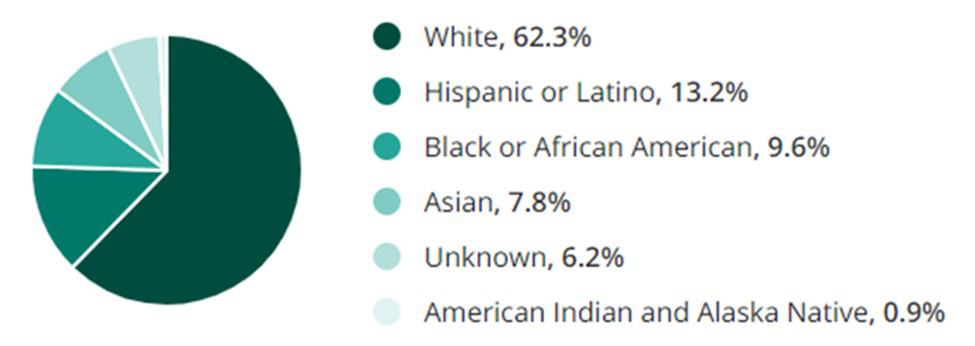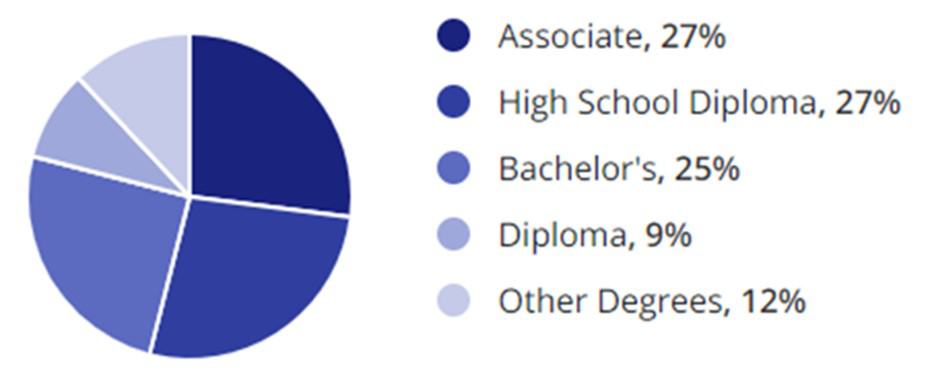Welcome to the ultimate guide to the world of mining. Mining jobs are a cornerstone of the global economy and more than just a source of precious minerals and materials. It is a field ripe with opportunities for innovation, growth, and contributions to sustainability. Whether you’re pursuing a career in underground mining jobs, eyeing positions in gold mining jobs, or exploring possibilities in energy mining jobs, this guide is your first step towards understanding the landscape and unlocking your potential within the mining sector.
Mining provides various career opportunities, including engineering, mine design, safety, and environmental management. The industry is currently adopting technological advancements and prioritizing sustainability and workforce diversity. Job seekers can be part of meaningful change by contributing to responsible extraction and use of natural resources.
Whether you’re a new graduate eager to make your mark or a seasoned professional seeking new challenges, the mining industry has a place for you. Diversity and inclusion are becoming increasingly paramount, with companies recognizing the value of diverse perspectives in driving innovation and operational excellence. It’s an exciting time to join the mining community, and we’re here to guide you every step of the way.
Read on to explore the depth of possibilities that await in the mining industry and discover how you can contribute your unique skills and perspectives to this vital and thriving sector.
Educational Requirements
The journey to securing a role in the mining industry begins with a strong foundation in education. Technical and engineering positions in mining require a bachelor’s degree in fields such as mining engineering, geology, or metallurgy. Notably, educational programs focusing on mining engineering provide comprehensive knowledge of mine design, mining technology, mine safety, and environmental reclamation.
Additionally, obtaining certifications can significantly improve one’s job prospects. For underground mining jobs, safety certifications, like the Mine Safety and Health Administration (MSHA),
mandated by regulatory bodies are crucial. As the industry evolves, specializing in areas like mine safety management jobs or mineral processing jobs gives candidates various mining jobs.
For those eyeing leadership roles or specialized positions in gold mining jobs or coal mining jobs, pursuing a master’s degree or Ph.D. can be advantageous. These advanced degrees often focus on research and the development of new mining technologies, placing individuals at the forefront of the industry.
Additionally, the mining sector values continuous learning and professional development. Engaging in workshops, seminars, and courses on the latest mining technologies, sustainable practices, and energy optimization in mining jobs can set a firm footing in this ever-evolving industry.
Areas of Expertise
Mining encompasses a wide range of specialties. Understanding these areas of expertise is vital for job-seekers aiming to find their niche in the mining sector.
- Mine Engineering: Mine engineering is at the heart of mining operations, focusing on designing and managing mine structures and the extraction process. Experts in this field work on making mining safer, more efficient, and less environmentally damaging.
- Geology: Geologists play a critical role in mining by locating and analyzing mineral deposits. Their expertise is essential in determining the viability of new mining sites and guiding the exploration of existing ones.
- Metallurgy: Metallurgists are involved in the processing and conversion of raw minerals into usable products. Their work is crucial in determining the best methods for extracting metals from ores, which is critical to gold mining jobs and other metal-focused mining activities.
- Mine Safety: Mine safety professionals ensure compliance with local and national safety regulations. Their work involves developing and implementing safety protocols to protect workers from hazards inherent in underground mining jobs and other mining environments.
- Environmental Management: The mining industry places increasing emphasis on reducing its environmental footprint. Specialists in ecological management focus on minimizing the impact of mining on the natural world, from water and air quality to biodiversity conservation.
- Quality Control and Assurance: Quality control specialists ensure mining operations adhere to standards and meet product specifications. Their work is critical in maintaining the integrity of mined materials, impacting everything from coal mining jobs to precious metal sites.
The diversity within the mining sector creates many opportunities. Whether your interest lies in the technical, environmental, or safety aspects of mining, there’s a niche for you. You can find a rewarding career that aligns with your skills and passions with the proper education and focus.
Demographics in the United States
Here’s a closer look at the ethnicity, gender, and age distribution among mining professionals.
While progress has been made in representation, more work is needed to better reflect the diverse markets we serve by aligning teams with the broader demographic landscape.
Ethnicity/Race:
- White: 62.3%
- Hispanic or Latino: 13.2%
- Black or African American: 9.6%
- Asian: Representing 7.8%
- Unknown: Approximately 6.2%
- NAtive American and Alaska Native: 0.9%

Gender:
- Male: 88.8%
- Female: 11.2%
Efforts are underway to balance this distribution further, encouraging more women to pursue careers in underground mining jobs, gold mining jobs, and other areas within the industry.

Age:
- The average age of workers in the mining industry is approximately 41 years, indicative of a mature workforce.
- However, the sector is seeing a gradual influx of younger professionals, bringing fresh perspectives, particularly in technology and sustainability in energy or mining jobs.
The US mining workforce is becoming more diverse and inclusive, leading to innovation and growth and reflecting a broader commitment to equality and opportunity.

Salary Trends
The mining industry offers competitive compensation, reflecting the demanding nature of the work and the significant expertise required. Here’s an overview of salary trends in mining jobs across the United States, highlighting the financial rewards of a career in this sector.
- Entry-Level Positions: Starting salaries for entry-level mining jobs, such as coal mining or less specialized roles, range from $50,000 to $60,000 yearly. These positions often serve as a stepping stone, offering on-the-job training and experience.
- Experienced Professionals: With experience, specialization, and increased responsibility, professionals can see significant growth in earnings. Salaries for experienced roles like mine engineers, geologists, and those in gold mining jobs can range from $80,000 to $100,000 annually. Key factors influencing compensation include location, the mineral being extracted, and the level of expertise.
- Senior Roles and Specializations: Senior roles and specialized jobs, such as underground mining jobs focusing on safety or environmental management, see considerable compensation. Salaries for these positions often exceed $150,000 annually, reflecting the high level of responsibility and expertise required.
The mining industry provides various financial incentives to its workers, such as bonuses, profit-sharing, and comprehensive benefits packages. These incentives recognize the challenging conditions of the work and its essential nature. Mining salaries are also on the rise due to factors such as the increasing global demand for minerals, advancements in mining technology, and the importance of sustainable practices.
Hiring Trends
The mining sector is witnessing major shifts in hiring trends driven by technological advancements, environmental concerns, and global market demands. Understanding these trends is crucial for job seekers and industry employers.
- Technological Innovations: As the industry embraces new technologies, there’s a growing demand for professionals skilled in automation, robotics, and data analysis. This innovation increases efficiency and opens up new roles focusing on tech-driven mining solutions.
- Sustainability and Environmental Focus: Mining companies are increasingly prioritizing sustainable and environmentally friendly practices. This shift has created a surge in demand for experts in environmental management, renewable energy integration, and conservation within mining operations.
- Diversity and Inclusion: There’s a noticeable effort across the mining industry to diversify its workforce, welcoming more women and underrepresented groups into various roles, from executive positions to on-site engineering jobs. These initiatives are not just about fair representation; they are also recognized as essential for fostering innovation, improving team dynamics, and enhancing decision-making processes.
- Global Demand for Minerals: The global demand for minerals, especially those critical for the renewable energy sector, such as lithium and cobalt, is driving job growth. This demand sustains traditional mining jobs and creates exploration, research roles, and environmental sustainability opportunities.
The current hiring trends in the mining industry reflect a sector in transition, adapting to new global challenges and opportunities. As the industry evolves, so do the prospects for professionals looking to build their careers in mining. The future of mining looks promising with a focus on innovation, sustainability, and diversity, offering opportunities for a new generation of experts.
Education Levels
The mining industry values diverse educational backgrounds, offering various entry points and career paths depending on one’s level of education. From vocational training to advanced degrees, education plays a pivotal role in shaping the future of those pursuing mining jobs.
- Vocational Training and Certificates: Vocational training programs and certificates provide practical skills and knowledge for specific roles within the mining sector. These programs are often focused on operational skills like equipment maintenance, safety protocols, and essential mineral processing techniques. They serve as the foundation for many entry-level positions in the industry.
- Bachelor’s Degree: A bachelor’s degree is the standard requirement for many technical and engineering roles in mining. Degrees in mining engineering, geology, metallurgical engineering, also environmental science are particularly relevant. These programs offer a mix of theoretical knowledge and practical skills necessary for a successful career in mining.
- Master’s Degree and PhD: Advanced degrees like a Master’s or Ph.D. are geared toward individuals seeking to specialize further or pursue research, academia, or high-level management careers. These degrees allow for deep dives into mine design, advanced mineral processing, and environmental sustainability, ultimately contributing to innovation and leadership within the sector.
The level of education attained not only affects the type of roles one might pursue but also impacts salary potential and advancement opportunities within the mining industry. Companies often encourage and support ongoing education and professional development, recognizing the value of a highly educated workforce in driving progress and sustainability in mining operations.

Skills in Demand
While rooted in tradition, the mining industry is fast evolving, influenced by technological advancements, environmental regulations, and global market shifts. This evolution directly impacts the skills currently in high demand within the sector. Here’s a snapshot of the skills helping professionals stand out in the competitive landscape of mining jobs.
Technical Proficiency
- Understanding Mining Software: Knowledge of mine design, planning, and management software is increasingly critical.
- Data Analysis: The ability to analyze geological data and make informed decisions is more valuable than ever.
- Automation and Robotics: Skills related to operating and maintaining automated mining equipment are sought after.
Environmental and Sustainability Expertise
- Environmental Management: Understanding the environmental impact of mining operations and ways to mitigate it is crucial.
- Sustainability Practices: Knowledge of sustainable mining practices and renewable energy solutions is critical for future-focused mining operations.
Safety and Regulation Compliance
- Health and Safety Standards: In-depth knowledge of safety protocols and regulations to ensure a safe working environment.
- Risk Assessment: The ability to conduct thorough risk assessments and implement preventive measures.
Soft Skills
- Communication: Effective communication skills are essential for collaboration among multidisciplinary teams.
- Leadership and Project Management: Skills in leading teams, managing projects, and driving operational efficiency are highly valued.
- Critical Thinking: The ability to solve complex problems and make data-driven decisions is a significant asset.
Professionals with technical expertise, environmental awareness, safety rigor, and strong interpersonal skills can advance in the mining industry. Continuous learning and skill development are critical strategies for those looking to thrive in the mining field.
Current & Future Mining Jobs Outlook
Various global and national factors, including demand for minerals, technological innovations, and sustainability initiatives, shape the outlook for mining jobs. Here’s what professionals and aspiring workers can expect regarding mining jobs’ current and future landscape.
- Stable Job Growth: The demand for minerals for construction, manufacturing, and energy, particularly those used in renewable energy technologies, underpins a steady job growth in the mining sector. Despite the industry’s cyclical nature, overall employment in mining jobs is expected to remain stable, with specific areas experiencing growth as the global economy transitions towards sustainability.
- Technological Impact: Technological advancements are double-edged swords; while automation and digitalization may reduce the need for some roles, they also create new opportunities in data analysis, environmental monitoring, and remote operations. Professionals with skills in these areas are likely to see increased demand.
- Green Mining and Sustainability: As environmental concerns grow, so does the focus on sustainable and responsible mining practices. Jobs related to environmental management, renewable energy integration in mining operations, and mine reclamation are expected to rise. Professionals with expertise in these areas will play a crucial role in shaping the industry’s future.
- Geographic Shifts: Emerging markets and developing countries are becoming increasingly important in the global mining landscape. This shift may influence job opportunities regarding location and the focus of mining activities, with an increasing emphasis on critical minerals for technology and green energy solutions.
The mining industry is evolving to meet global material and energy demands while addressing economic, environmental, and social responsibilities. For those with the right skills and a forward-looking mindset, the future holds promising opportunities in mining jobs across a spectrum of roles and specialties.
FAQ’s
What Education Is Required for a Career in Mining?
Most careers in mining require a bachelor’s degree in fields like mining engineering, geology, or metallurgy. Additional certifications and safety training are often needed, especially for roles in underground mining.
Are There Opportunities for Advancement in the Mining Industry?
Yes, the mining industry offers diverse pathways for career advancement. Acquiring experience, education, and skills can lead to leadership roles in project management, environmental stewardship, and technical innovation.
Is the Mining Industry Open to Diversity?
Absolutely. The industry is diversifying its workforce to bring in valuable perspectives for innovation, safety, and efficiency. Initiatives to include more women and underrepresented groups are increasingly common.
What Are the Risks Associated with Mining Jobs?
Mining, mainly underground mining, involves various risks related to safety and health due to the nature of the work environment. However, efforts and regulations have made the industry safer than before.
How Is Technology Impacting the Mining Industry?
Technology is transforming the mining industry in several ways, including automation, data analytics, and environmental monitoring. These technologies improve efficiency and safety and create new roles and demand for tech-savvy professionals.
What Does the Future Hold for Mining Jobs?
The future of mining jobs is closely tied to global demands for minerals, technological advancements, and sustainability goals. Jobs related to environmental management, technology, and renewable energy in mining are expected to see growth.
Additional Resources
Numerous resources are available for deeper mining industry exploration, offering education, career guidance, and insights into current trends. Here are some valuable resources:
- The Mine Safety and Health Administration (MSHA) offers comprehensive resources on mine safety, regulations, and training to ensure the well-being of mining professionals.
- The U.S. Geological Survey (USGS) provides detailed information on mineral resources, geological data, and environmental aspects related to mining.
- The Society for Mining, Metallurgy & Exploration (SME) is a prominent professional society offering networking opportunities, educational materials, and conferences on mining and exploration.
- The U.S. Department of Energy shares insights on the role of minerals in energy production, highlighting the intersection of mining and renewable energy sectors.
- Academic institutions like the Colorado School of Mines provide specialized programs and research opportunities in mining engineering and related fields, shaping the next generation of mining professionals.
These resources can significantly assist in career planning, continuous education, and staying updated on mining industry developments. Explore these resources to enhance your knowledge and find opportunities in the mining industry as a student or professional.
Conclusion
The mining industry presents opportunities for individuals passionate about making a meaningful impact through their work. The sector adapts to 21st-century challenges through sustainability, innovation, and diverse workforce initiatives. Mining offers an exciting career path in engineering, environmental management, safety, and various other specialties, promising rewarding opportunities.
Exploring education, expertise, demographics, as well as in-demand skills shows mining careers extend beyond extracting minerals. It involves contributing to sustainability, innovating for efficiency and safety, and joining a diverse, inclusive professional community.
Join Diversity Employment today for access to job listings, networking, and career resources, plus insights into diversity efforts in mining and beyond. Your next opportunity to make a difference in the mining industry starts here. Discover where your skills and passions can lead you in the remarkable mining world!




